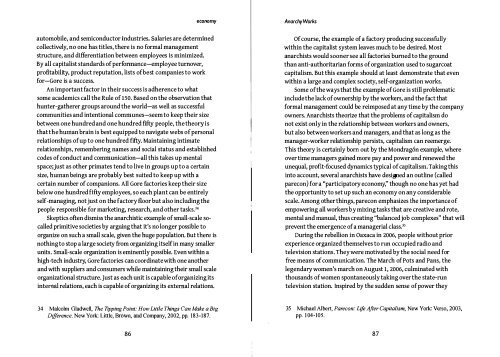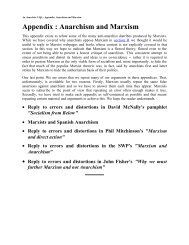Anarchy Works.pdf - Infoshop.org
Anarchy Works.pdf - Infoshop.org
Anarchy Works.pdf - Infoshop.org
Create successful ePaper yourself
Turn your PDF publications into a flip-book with our unique Google optimized e-Paper software.
economy<br />
<strong>Anarchy</strong> <strong>Works</strong><br />
automobile, and semiconductor industries. Salaries are determined<br />
collectively, no one has titles, there is no formal management<br />
structure, and differentiation between employees is minimized.<br />
By all capitalist standards of performance-employee turnover,<br />
profitability, product reputation, lists of best companies to work<br />
for-Gore is a success.<br />
An important factor in their success is adherence to what<br />
some academics call the Rule of 150. Based on the observation that<br />
hunter-gatherer groups around the world-as well as successful<br />
communities and intentional communes-seem to keep their size<br />
between one hundred and one hundred fifty people, the theory is<br />
that the hwnan brain is best equipped to navigate webs of personal<br />
relationships of up to one hundred fifty. Maintaining intimate<br />
relationships, remembering names and social status and established<br />
codes of conduct and communication-all this takes up mental<br />
space;just as other primates tend to live in groups up to a certain<br />
size, hwnan beings are probably best suited to keep up with a<br />
certain number of companions. All Gore factories keep their size<br />
below one hundred fifty employees, so each plant can be entirely<br />
self-managing, not just on the factory floor but also including the<br />
people responsible for marketing, research, and other tasks,34<br />
skeptics often dismiss the anarchistic example of small-scale 50-<br />
called primitive societies by arguing that it's no longer possible to<br />
<strong>org</strong>anize on such a small scale, given the huge population. But there is<br />
nothing to stop a large society from <strong>org</strong>anizing itself in many smaller<br />
units. Small-scale <strong>org</strong>anization is eminently possible. Even within a<br />
high-tech industry; Gore factories can coordinate with one another<br />
and with suppliers and conswners while maintaining their small scale<br />
<strong>org</strong>anizational structure. Just as each unit is capable of <strong>org</strong>anizing its<br />
internal relations, each is capable of <strong>org</strong>anizing its external relations.<br />
of course, the example of a factory producing successfully<br />
within the capitalist system leaves much to be desired. Most<br />
anarchists would sooner see all factories burned to the ground<br />
than anti-authoritarian forms of <strong>org</strong>anization used to sugarcoat<br />
capitalism. But this example should at least demonstrate that even<br />
within a large and complex society, self-<strong>org</strong>anization works.<br />
Some of the ways that the example of Gore is still problematic<br />
include the lack of ownership by the workers, and the fact that<br />
formal management could be reimposed at any time by the company<br />
owners. Anarchists theorize that the problems of capitalism do<br />
not exist only in the relationship between workers and owners,<br />
but also between workers and managers, and that as long as the<br />
manager-worker relationship persists, capitalism can reemerge.<br />
This theory is certainly born out by the Mondrag6n example, where<br />
over time managers gained more pay and power and renewed the<br />
unequal, profit-focused dynamics typical of capitalism. Taking this<br />
into account, several anarchists have designed an outline (called<br />
parecon) for a "participatory economy," though no one has yet had<br />
the opportunity to set up such an economy on any considerable<br />
scale. Among other things, parecon emphasizes the importance of<br />
empowering all workers by mixing tasks that are creative and rote,<br />
mental and manual, thus creating "balanced job complexes" that will<br />
prevent the emergence of a managerial class."<br />
During the rebellion in Oaxaca in 2006, people without prior<br />
experience <strong>org</strong>anized themselves to run occupied radio and<br />
television stations. They were motivated by the social need for<br />
free means of communication. The March of Pots and Pans, the<br />
legendary women's march on August 1, 2006, culminated with<br />
thousands of women spontaneously taking over the state-run<br />
television station. Inspired by the sudden sense of power they<br />
34 Malcolm Gladwell, The Tipping Point: How Little Things Can Make a Big<br />
Difference. New York: Little, Brov.'ll, and Company, 2002, pp. 183-187.<br />
35 Michael Albert, Parecon: Life After Capitalism, New York: Verso, 2003,<br />
pp. 104-105.<br />
86<br />
87
















